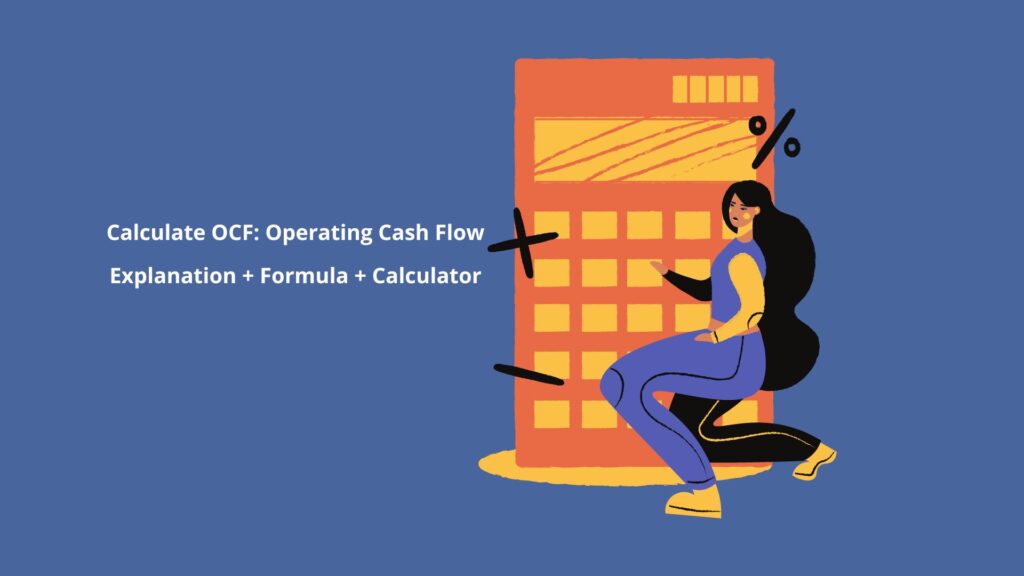Despite the fact that 70% of small firms are focused on enhancing their financial stability, almost 30% of them still experience negative cash flows as a result of poor money management. It is crucial to understand the basics of accounting so that you can manage your business finances smoothly.
In addition to many other important financial metrics, operating cash flow stands at the core of the business.
Operating cash flow is the profit made by a company following its daily expenses. It is the amount of money a company makes after subtracting its operating costs, such as rent, CGS, etc., from its total revenue.
Why Do You Need to Calculate OCF (Operating Cash Flow)
Calculating operating cash flows is crucial because it represents the company’s financial position. That is why it’s advisable to keep track of this metric to be aware of your company’s profitability and where it is headed.
Operating cash flow can help:
- financial analysts observe the operating profit of businesses when they are trying to analyze how successful a business is.
- investors observe the profits a company generates in order to invest in the company’s stock.
- banks to determine the creditworthiness of companies to lend them loans
Is There a Difference Between OCF and Net Income?
Operating cash flow and net income are entirely different terms.
Operating cash flow can be defined as the profit generated solely from business operations. Investments, taxes, and interest rates are not accounted for in the operating cash flow.
Net income is defined as the total revenue that a company produces from sales after deducting interests, taxes, investments, and all other expenses from the profit.

Methods to Calculate OCF (Operating Cash Flow)
There are two methods used to calculate operating cash flow. One is the direct method, which gives an overview of your business’s profitability, and the other is the indirect method, which gives you a broader perspective on your business operations.
Indirect Method to Calculate OCF
As stated above, the indirect method provides a better insight into business operations because it accounts for non-cash items, depreciation, and any other adjustments.
The indirect method can be calculated by using the following formula:
Operating Cash Flow= Net Income +/- Changes in Assets and Liabilities + Non-Cash Expenses
Example of Calculating OCF Using Indirect Method
Consider a scenario where your business is thinking to expand its operations and your business generates the following figures:
Net income= $500,000
Depreciation= $15,000
Accounts receivable adjustments = +$40,000
Inventory adjustments: -$10,000
Accounts payable adjustments: -$20,000
Operating Cash Flow= $500,000 – $40,000 + $15,000 + $10,000 + $20,000 = $505,000
This shows that your business has a profit of $505,000 which can be used for expansion purposes.
[CP_CALCULATED_FIELDS id=”10″]
Direct Method to Calculate OCF
The direct method is one of the simplest methods used for calculating operating cash flow. However, this method is subject to the constraint of providing less information.
It can be calculated by using the following formula:
Operating Cash Flow = Total Revenue – Operating Expenses
Example calculating OCF using Direct Method
Consider, you are thinking of purchasing new machinery and for that, you need to look into the financial position of your business.
Take the following figures:
Total Revenue = $200,000
Operating Expenses= $120,000
Operating Cash Flow= $200,000 – $120,000 = $80,000
This shows that the company has $80,000 in profits, which can be used to purchase new machinery.
[CP_CALCULATED_FIELDS id=”11″]
Limitations of Operating Cash Flow?
Operating cash flow is a useful indicator of a company’s liquidity and potential. However, operating cash flow (OCF) has a number of limitations, such as:
- OCF does not account for changes in working capital, such as adjustments to inventory or accounts receivable.
- OCF does not account for cash flow generated from discontinued operations
- The inclusion of non-cash components, like stock-based compensation or the amortization of intangible assets, can further affect OCF.
- OCF excludes cash flow from non-operating sources like loans and investments.
- Depreciation and other one-time items can have a massive impact on OCF.
Still Not Sure How it Works, Talk With a Professional Accountant
We understand that these concepts are complicated to understand if you are not from a finance or accounting background. However, you can take help from a professional accountant who has spent years understanding the financial health of the company.
Talk with an accountant today, and save your extra time.
